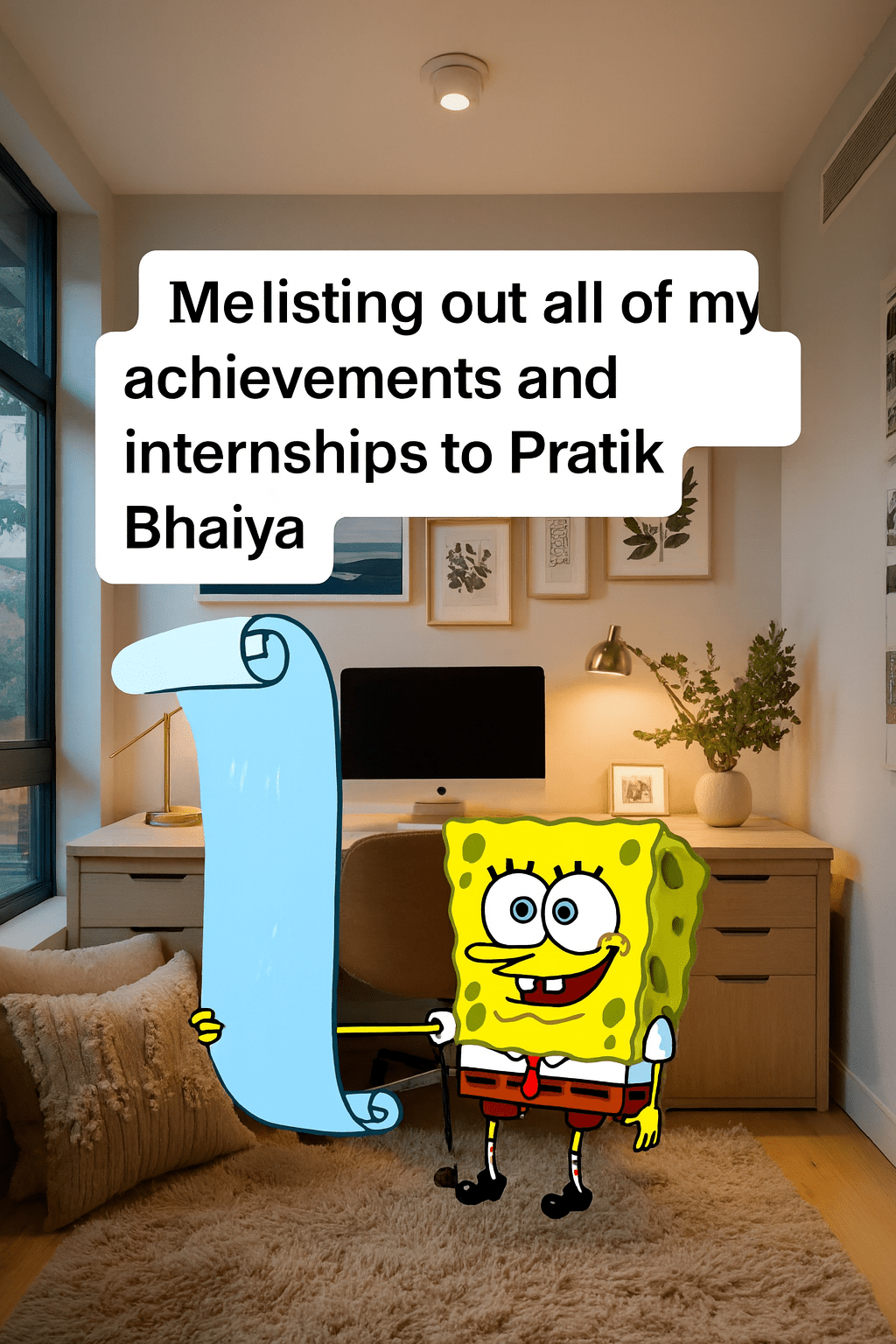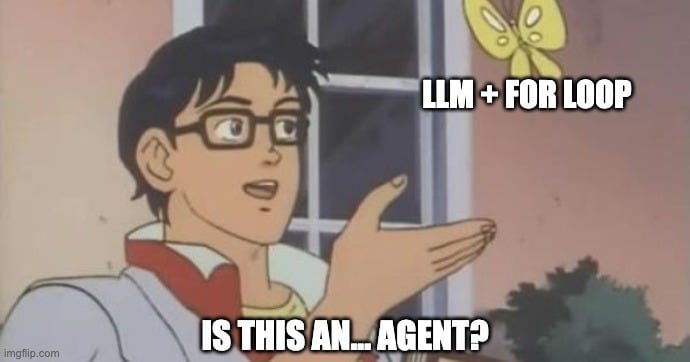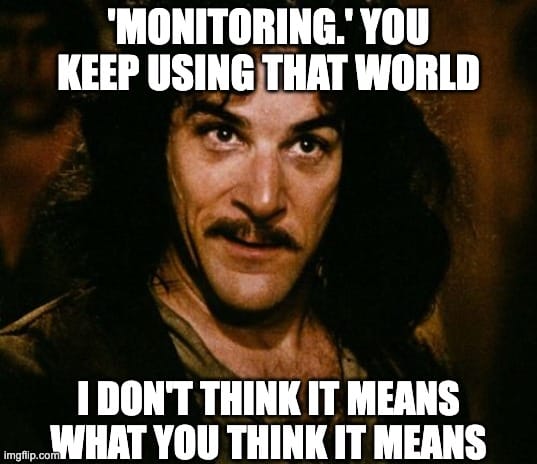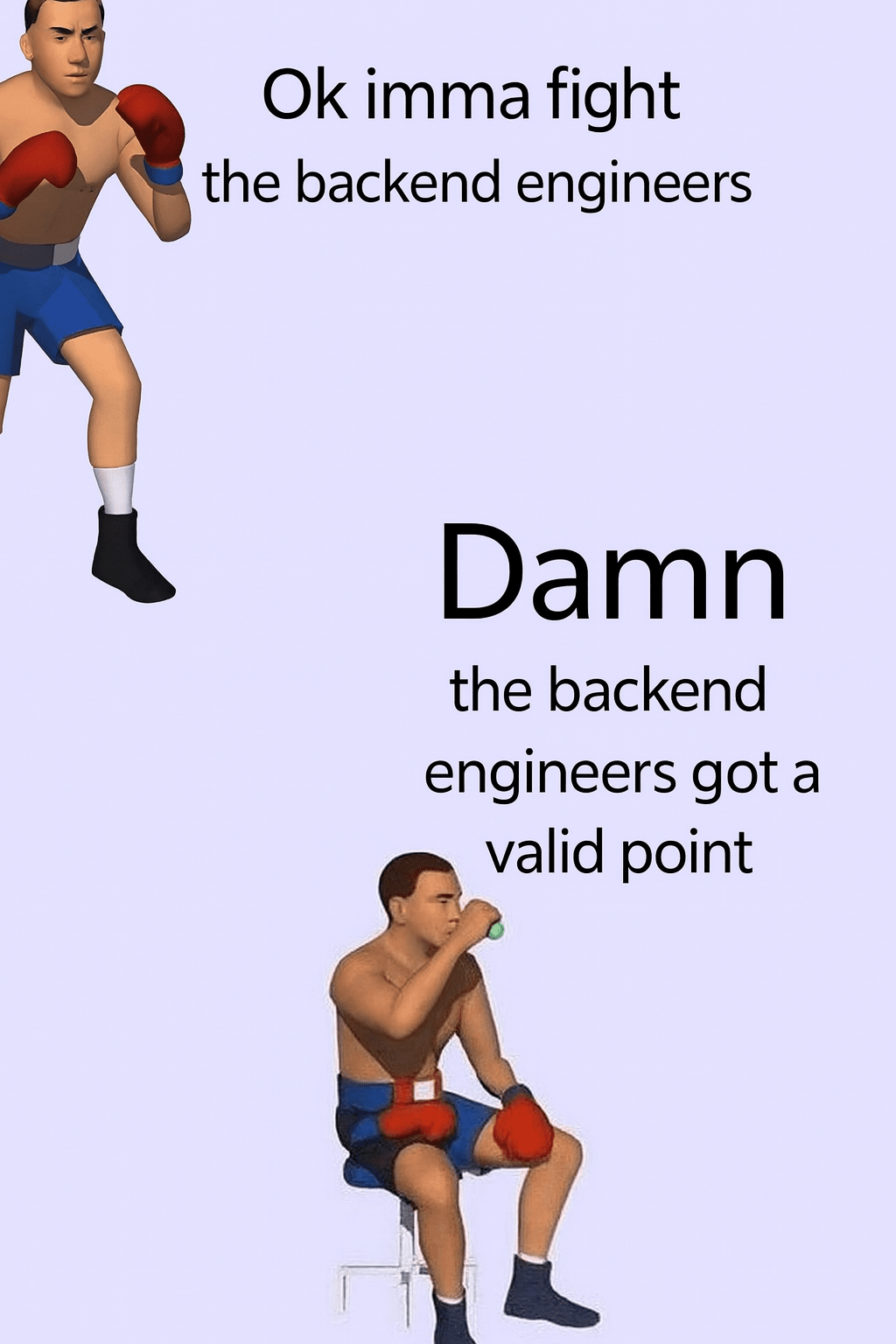[Mock Interview Series - 1] Sky : Pratik : Devops
![[Mock Interview Series - 1] Sky : Pratik : Devops](https://res-2.cloudinary.com/pointblankdsce/image/upload/q_auto/IMG_2166.jpg?_a=BAMAK+fi0)
Recently, I had the opportunity to participate in a mock interview with Pratik Singh, a Distribution Engineer at GitLab and one of my most respected seniors. Needless to say, The pressure to maintain my rep. was real.
This blog is written in the format of QnA of the interview transcript, for the sake of it you can imagine our faces throughout the interview as

Introduction
I am Akash Singh, a final year engineering student and Open Source Contributor from Bangalore.
Here is my LinkedIn, GitHub and Twitter

I go by the name SkySingh04 online.
Interviewer (Pratik): Hi Akash! Let me introduce myself first. I'm Pratik Singh, working as a Distribution Engineer at GitLab. This is my second job - I was previously at NASDAQ. My expertise is primarily in Kubernetes and DevOps, and at GitLab, I create CNG images and packages for various GitLab components. How about you?
Me: Nice to meet you! I'm Akash, currently in my final year at Dayananda Sagar College of Engineering, Bangalore. I work as a DevOps Engineer at FinalRound AI, where I maintain services on Kubernetes across a multi-cloud setup (AWS, GCP, Azure, and some Alibaba Cloud). I've also completed Google Summer of Code 2024 with Keploy and Linux Foundation Mentorship 2025 with LitmusChaos. Recently, my team was ranked #1 in India at a hackathon in Singapore!

Question 1: Why are you looking for new opportunities?
Pratik: If you're already working at FinalRound AI, why are you trying to explore new opportunities?
Me: My work at FinalRound AI was most crucial during the early days when we set up all infrastructure from scratch - creating robust systems, proper monitoring, and alerts. Now that everything is running smoothly and all services are stable, the work has evolved into more of a maintenance phase. There isn't much new for me to learn or build, which is why I'm exploring new opportunities.
Akash claiming that he has finished DevOps At FRAI (Prod Breaks once every month)

Question 2: Infrastructure as Code Implementation
Pratik: How did you set up Infrastructure as Code from scratch? Did you standardize the process across different cloud providers?
Me: Before I joined, all eight microservices were running based on click-ops - someone would manually go to the Kubernetes dashboard without any visibility, GitOps practices, or tracking. I immediately recommended moving to Infrastructure as Code using Terraform (based on my experience at Aspora).
In the first two months, we relied on Helm-based deployments, but by August, we moved completely to ArgoCD-based deployments using Kustomize. This helped us scale from 8 to 22 microservices efficiently.
Follow-up: Why was IaC needed if you already had Kubernetes clusters running?
Me: Replicating infrastructure for new services was becoming problematic. We grew from 8 to 22 microservices, and without IaC, setting up new services would have been a huge problem. IaC made it replicable and gave us visibility into what was actually running.
Akash the moment he entered FRAI

Question 3: Migration from Helm to ArgoCD
Pratik: Why did you think moving from Helm to ArgoCD was better, especially when Helm charts are a big thing in Kubernetes?
Me: There were several reasons:
- CI/CD failures: Our previous workflow using kubectl commands had many failures
- Visibility: Backend engineers had no access to Kubernetes or visibility into deployments
- Self-service: With ArgoCD UI, engineers can view the entire deployment process, see which services are failing, check logs, and understand why services are unhealthy
- Reduced dependency: This decoupled our backend team from depending on DevOps for every deployment
Follow-up: Isn't giving backend engineers access to manage clusters risky?
Me: Absolutely! That's why we use ArgoCD's user roles. Backend and frontend engineers only have read-based access, while the lead backend engineer has contributor access. They can restart pods or deployments but cannot destroy resources or change config files - that's restricted to the DevOps team only.
Giving Backend Engineers access to K8s and the moment something fails, Backend Devs:

Question 4: AI Agents and LLM Workflows
Pratik: What did you work on with AI agents and LLM-powered workflows?
Me: We wanted workflows to monitor user activity in our application - what they're doing in Notion, Slack, what they're Googling, etc. This was done via ScreenPipe (an open-source version of Windows Recall).
We set this up on virtual machines where ScreenPipe has an MCP server that our agentic AI can query. For example, the agent could determine if a user was actually reading documentation between 10 AM to 2 PM or just slacking off.

Question 5: Experience with Monitoring Stack
Pratik: How much experience do you have with Prometheus and Grafana?
Me: I've worked extensively with Prometheus, Grafana, OTEL, Loki, and Promtail since January at Aspora. I set up the entire monitoring stack from scratch with my senior.
The architecture was:
- Central Grafana, Prometheus, and Loki instances
- Promtail running as a sidecar on every ECS instance
- Promtail forwards logs to centralized Loki
- All metrics go to centralized Prometheus
- Everything queryable through centralized Grafana
We had a separate AWS account for all monitoring tools, everything running on ECS.

Question 6: CI/CD Pipeline Experience
Pratik: Can you tell me about your hands-on experience with pipelines? How many teams were you supporting?
Me: Currently, I handle all CI/CD pipelines at FinalRound AI across 3-4 teams (marketing, frontend, backend). But I'd like to highlight my Linux Foundation mentorship where I worked on integrating chaos engineering into CI/CD pipelines.
I built an SDK for LitmusChaos 3.0 to enable BDD tests in pipelines. The goal was to allow companies to test applications with chaos engineering in CI/CD pipelines, even on single-node instances. My junior is now using my project for his CloudNativePG work!

Question 7: Experience with Ansible
Pratik: What's your experience with Ansible? What's your favorite thing about it?
Me: My Ansible experience is more limited compared to Terraform. I was introduced to it at FinalRound AI for provisioning VMs. I've explored it for setting up bare metal servers for internal services.
What I love most about Ansible is that it doesn't need any agent running in the background - everything is SSH-based. No overhead, no worrying about agent crashes. It's a really neat design!
I dont have a meme for Ansible, Because I am the meme ( I dont know much ansible but I somehow convinced bhaiya that I did xD)
Question 8: Singapore Hackathon Project
Pratik: Can you explain your project at Hack Global Singapore?
Me: We built an agentic AI called "Lumi" for a hotel chain sponsor. Lumi was a voice-and-face assistant serving as a point of contact between customers and hotel staff to reduce mean time to resolution for common queries.
For example, if a customer calls about missing towels, Lumi understands the context and automatically files a request with staff management. This automates the workflow without human intervention for routine requests.
Follow-up: Isn't an AI agent overkill for problems hotels already know about?
Me: Actually, it's the opposite! The goal is to reduce mean time to resolution. With limited staff to answer queries, an AI agent can handle routine requests (like towels) without a human having to pick up, greet the customer, understand the issue, and redirect. This makes the experience faster and more satisfying for customers while reducing staffing costs.
Me including the Singapore Hackathon in every conversation because the flex is real

Question 9: Handling Disagreements
Pratik: Give me an instance where you had a disagreement with your seniors. How did you handle it?
Me: When I proposed moving to Infrastructure as Code at FinalRound AI, there was backlash from senior backend engineers. They thought DevOps bandwidth should focus on other P0 tasks.
I resolved this by:
- Scheduling a meeting with the backend engineering lead
- Thoroughly explaining the problems IaC would solve
- Clarifying that our workload would multiply with increasing microservices
- Negotiating a compromise - I prioritized their LLM latency concerns first, then moved to IaC migration after
The key was proper communication and finding middle ground where both priorities could be addressed.
The rivalry between backend engineers and Devops Engineers is honestly very real. As someone who has played both sides before, I always tend to hate the other side for the sake of it.

Question 10: Managing Complex Technical Challenges
Pratik: Can you share a complex technical challenge you faced?
Me: One interesting challenge was provisioning Windows VMs with desktop access for users worldwide with minimal latency. The requirements were:
- Full UI operating system (Windows specifically)
- Remote desktop protocol access
- Lowest possible latency globally
- Solution for China (firewall issues)
The complexity came from varying latency - what worked for me in India had high latency for our US-based CTO, and China had firewall restrictions.
After extensive testing across providers, we settled on:
- AWS WorkSpaces for most regions (lowest latency globally)
- Alibaba Cloud for China users (exact replica service)
I managed expectations through daily updates, explaining progress and next steps, ensuring we found the perfect solution rather than rushing.
At this point we were towards the end of the interview, hence Bhaiya asked If I had any questions for him :
Akash: How do you manage working on planned deliverables while handling ad-hoc requests?
Pratik: This Tweet : https://x.com/SkySingh04/status/1966898918039711858
Interviewer's Feedback :
These were some of the point's that Bhaiya wanted me to improve upon. He mentioned that my technical skills are upto the mark and the following are behavioral nitpicks (according to him)
- Try to talk slow : (Sorry bhaiya I am a yapper by heart)
- Try and take notes : Show to interviewer : Can you tell me what are the exact requirements of docker swarm that you need (note that)
- Docker swarm + Nomad : These are mentioned in the JD you are applying for, take a look at them before going for the interview.
- Talk about other firms as well (not just finalroundai) : Include experiences and examples from all of our 10 internships
Thank you Pratik Bhaiya for taking out the time for this interview. You are always an inspiration for me and other juniors alike <3
